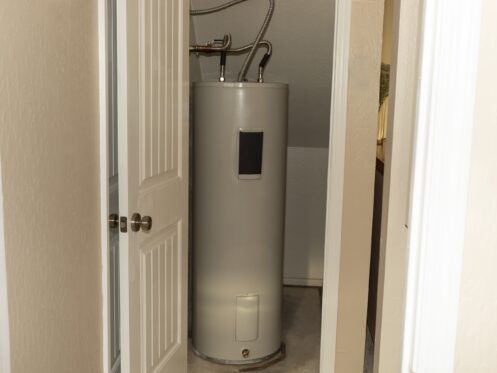Your water heater quietly works behind the scenes every day, giving you hot showers, warm water for laundry, and everything in between. Yet you may not think about maintaining your water heater until something goes wrong. One of the simplest but most effective ways to protect your water heater is to flush it regularly. Let’s look at why flushing your water heater is important, how often you should do it, and how this small step can help you avoid bigger headaches down the road.
Why Flushing Your Water Heater Matters
Every time water flows into your water heater, it brings minerals like calcium and magnesium with it. These minerals settle to the bottom of your tank over time, forming a layer of sediment. This sediment can cause a range of problems for your system. It creates an insulating layer between the heating element and the water, forcing your heater to work harder to do the same job. As the system works harder, it uses more energy, which means your utility bills can quickly increase.
Sediment buildup also reduces your tank’s capacity, so you might notice less hot water being available when you take a shower. It can even cause strange popping or rumbling noises as trapped water bubbles up or moves through the sediment. If left alone, that buildup speeds up corrosion in the tank, which increases your risk of leaks that can lead to complete system failure. Flushing the tank helps remove these minerals, protecting your water heater’s efficiency and lifespan.
How Often Should You Flush Your Water Heater?
In most homes, flushing the water heater once a year works well. An annual flush helps clear out sediment before it has a chance to solidify or cause performance issues in your system. If you live in an area with hard water, which has a higher mineral content, you might need to flush your water heater every six months. Hard water tends to speed up sediment buildup, so staying ahead of it is critical.
If you’re not sure whether you have hard water, you can check your local water utility’s annual water quality report or talk to a plumber at Bumble Breeze. We can test your water and help you determine the best maintenance schedule for optimal water heater performance.
What Happens if You Skip Flushing Your Water Heater?
When you ignore your water heater for years, sediment buildup can become rock-hard, making it much harder to remove. The heater has to work overtime to keep the water warm, wasting energy and money every month. In the worst cases, built-up sediment can completely block the drain valve.
If you haven’t flushed your system in years or it is older, it might already be experiencing corrosion or leaks that require repair or replacement. Staying on top of this task helps you avoid costly surprises like waking up to a leaking tank or running out of hot water halfway through your shower.
Signs That You Need to Flush Your Water Heater
Sometimes you will notice signs that it’s time for maintenance, even if you’re not due for an annual flush yet. If you hear popping, banging, or rumbling sounds coming from your tank, that’s one of the biggest red flags. Those noises mean steam bubbles are struggling to push through the sediment layer.
Other signs include water temperatures that only reach lukewarm levels and water that looks cloudy or rusty. When sediment covers the heating element, it takes more energy to get your water to the right temperature, and that shows up in your utility costs. If you notice any of these warning signs, call a plumber to inspect the issue before it worsens.
Professional Flushing and Inspection
Flushing a water heater is not a quick project that you can do yourself, especially if your tank hasn’t been regularly maintained. Draining the tank incorrectly could cause leaks or damage parts, such as the drain valve. That’s why it’s best to have one of our licensed plumbers at Bumble Breeze handle this job.
A professional flush doesn’t just remove sediment from your tank. Our team will also inspect your system for signs of corrosion, leaks, or worn-out parts. We’ll check your anode rod, the metal rod that attracts corrosive minerals and helps prevent rust inside the tank. If the anode rod shows wear, we will replace it before corrosion occurs. We can make sure that your pressure relief valve is functioning and identify any hidden issues that could impact your system’s performance.
How Tankless Water Heaters Handle Sediment
Tankless water heaters do not store water like traditional tanks do, but they still require attention to stay efficient. These units can develop mineral scale on the heat exchanger, which reduces performance over time. While they don’t need flushing in the same way, they do benefit from a regular descaling process, which removes the buildup of minerals and keeps your system running smoothly.
Most manufacturers recommend descaling a tankless system at least once a year, especially if your home has hard water. At Bumble Breeze, we offer this service to keep your tankless unit in optimal condition. If your home does not have a tankless water heater, contact us to determine if it is a tankless water heater is the best option for your home.
Even with the best care, your water heater won’t last forever. If your system is more than 10 years old, needs constant repairs, or has sediment buildup despite regular flushing, it may be time to consider an upgrade. Today’s energy-efficient models heat water more effectively, which saves you money on utility bills in the long run. Switching to a tankless unit saves space and provides endless hot water on demand.
Are you thinking of switching to a tankless water heater? The benefits of a tankless system are endless!
Tips for Minimizing Sediment Buildup
While you can not prevent minerals from getting into your water heater, you can take a few steps to help slow the buildup. If you live in an area with hard water, installing a whole-home water softener can greatly improve the quality of your water. A softener removes minerals from the water, like calcium and magnesium, before they enter your water heater, protecting not only your tank but also your pipes, faucets, and appliances.
If you use well water or have visible sand or debris in your water, a sediment filter helps to capture larger particles before they reach the tank. Of course, sticking to a regular flushing schedule is key to optimizing how well your water heater works.
Most tank water heaters last eight to twelve years when properly maintained. By regularly flushing out sediment, you help your heater run more efficiently and lower the risk of rust and corrosion. These benefits often mean you’ll get closer to the top end of your water heater’s life expectancy.
Contact Us to Keep Your Hot Water Flowing
Flushing your water heater might not top your list of exciting home tasks, but it’s one of the simplest ways to protect your comfort. If you haven’t flushed your water heater in a long time, schedule a professional service now. At Bumble Breeze, we have been serving the Las Vegas community since 2018, so we can recommend upgrades and maintenance schedules that work for your needs.
Contact us at Bumble Breeze to schedule a maintenance session today. We’ll keep your water heater working smoothly for years to come!


